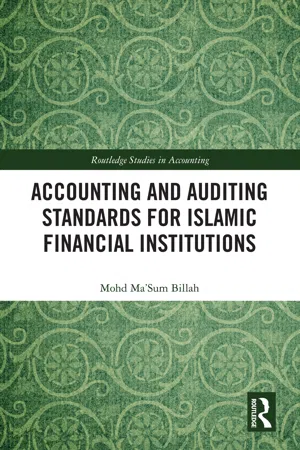
- 286 pages
- English
- ePUB (mobile friendly)
- Available on iOS & Android
Accounting and Auditing Standards for Islamic Financial Institutions
About this book
While accounting and audit functions are significantly regulated and standardized in conventional financial industries and activities, through the implementation of International Accounting Standards, and International Financial Reporting Standards, as well as other international, regional, and local regulations, this is not the case for Islamic financial organizations. Rather than having their own set of comprehensive accounting or auditing standards or policies, these are based, in some cases, on the Accounting and Auditing Organization for Islamic Financial Institutions (AAIOFI), the Islamic Financial Services Board (IFSB)'s standards and Shari'ah based local policies.
This book is a timely and comprehensive overview of accounting and auditing standards within the doctrine of Shari'ah. It offers a significant contribution to the field and a wealth of technical know-how. It analyzes Islamic accounting and auditing both in theory and practice and from a distinctly international perspective. The chapters are arranged in a systematic and logical way making it easily accessible and engaging.
The book evaluates the existing standards and widens the scope of the discourse to include Maqasid al-Shari'ah, Islamic accounting and audit models and standards, as well as, offering practical policy recommendations. The author presents a Shari'ah justified solution to Islamic Accounting and Audit and offers guidance on overcoming the challenges to implementing Islamic Accounting and Auditing Standards.
The book is a unique and exhaustive guide and, as such, will be an invaluable resource for academics, researchers, students, policymakers, as well as, practitioners in accounting and auditing firms and financial institutions.
Frequently asked questions
- Essential is ideal for learners and professionals who enjoy exploring a wide range of subjects. Access the Essential Library with 800,000+ trusted titles and best-sellers across business, personal growth, and the humanities. Includes unlimited reading time and Standard Read Aloud voice.
- Complete: Perfect for advanced learners and researchers needing full, unrestricted access. Unlock 1.4M+ books across hundreds of subjects, including academic and specialized titles. The Complete Plan also includes advanced features like Premium Read Aloud and Research Assistant.
Please note we cannot support devices running on iOS 13 and Android 7 or earlier. Learn more about using the app.
Information
Part I
Shari’ah standard of accounting
1
Islamic accounting system
Introduction
“O you who believe! When you deal with each other, in transactions involving future obligations in a fixed period, reduce them to writing.”(al-Baqarah: 282)
Accounting system
Conceptual framework
Shari’ah requirement
As an alternative to interest, Islamic banks use various mechanisms in their mobilization and uses of funds. Two of these mechanisms (Al-Musharakah and Al-Mudharabah) are based on the concept of profit and loss sharing while the others are similar to cost plus margin of profit (Al-Murabaha), leasing financing (Al-Ijarah) and hire-purchase financing (Al-Ijarah-wa-igtina).
Underlying principles
Al-Murabahah (sale by deferred payment)
Al-Mudharabah (co-partnership)
Al-Musharakah (partnership)
Table of contents
- Cover Page
- Half Title Page
- Series Page
- Title Page
- Copyright Page
- Dedication Page
- Contents Page
- List of figures Page
- List of tables Page
- Acknowledgment Page
- About the author Page
- Foreword Page
- Preface Page
- Introduction
- Part I Shari’ah standard of accounting
- Part II Shari’ah audit standard
- Bibliography
- Index